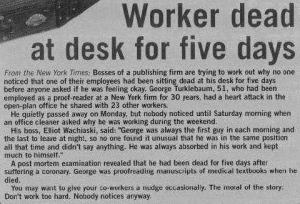 I got an email from an attorney who read my story about the changes I made in my practice that increased my cash flow. (If you’re on my newsletter list, you have or will get the email, promoting my Cash Flow for Attorneys program). One of the things I did was delegate as much of my work as possible, eventually getting to the point where I did “only those things that only I could do.”
I got an email from an attorney who read my story about the changes I made in my practice that increased my cash flow. (If you’re on my newsletter list, you have or will get the email, promoting my Cash Flow for Attorneys program). One of the things I did was delegate as much of my work as possible, eventually getting to the point where I did “only those things that only I could do.”
In reply, this attorney said,
“The lesson may be that sacrificing quality and personal attention to the clients can raise your bottom line. The moral should be: what client would pick that savvy business owner over the harder working practitioner?”
I understand how one might think that delegating as much as possible and running your practice like a business would lead to a lower level of quality or personal attention. In reality, it is just the opposite.
My clients got a higher level of service and more personal attention because I wasn’t trying to do everything myself. Think about it: attorneys works long hours and are stretched so thin they often don’t have time for lunch. They have less time for clients because they’ve got too many other things to do.
When you delegate work, it frees you up to do the things that really matter. You have time to greet new clients and introduce them to the staff who will take care of the mundane work. You have time and energy to oversee the important legal work, and to perform the work that “only you can do”. And you have time for marketing, so you can bring in more good clients, allowing you to hire more staff to better serve your growing practice.
If you’re trying to do too much yourself, you must find a way to delegate as much as possible. Continue to supervise your employees, to make sure the work is getting done and the clients are getting served, but let go of the notion that just because nobody can do it better than you means nobody but you should do it.
Do the math: you’re worth at least $300 an hour and, arguably, much more. If you continue to do $25 an hour clerical work, you’re working for your practice, not the other way around.
A law practice is first, a business. That business hires you, the professional. As the owner of that practice, you earn for what you do as a professional and you earn a profit on what your business takes in from paying clients. If your business doesn’t bring in clients, you won’t have anyone for whom to practice your profession.
I was a sole practitioner for my entire legal career, and I worked hard. Damn hard. Early on, I worked long hours and was always on the brink of exhaustion. I did my best to serve my clients but my best was limited to what I was able to give them with the limited time and energy at my disposal. It wasn’t until I starting working smart and delegated as much as possible that I was able to achieve the levels of financial success and time freedom I ultimately enjoyed. And because I was “selfish” enough to make that leap, my clients got better service than they ever got when I was doing almost everything myself.







